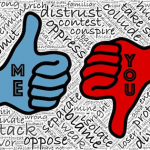
FRANK SCHAEFFER (former Evangelical Christian): I do not believe in hell. Nor do I believe in heaven. What else don’t I believe in? Maybe none of IT– “IT” being any and all packages of religious doctrine Christian or otherwise. Then again I do not believe in secularism either. I also believe that rationality is a delusion. We are irrational creatures, and the happiest people and societies accommodate that fact. What’s your reaction to this?
LUKE MOON (Evangelical Christian): Well, to be honest, I’d say I don’t believe you. I don’t spend time with you apart from this weekly discussion we have, so I can’t say that based upon my observation of your actions. However, I do say it based upon my general understanding of your actions in relation with other people.
One of the principles of economics is that people operate within the margins, which means that people operate in a predictable manner. If that manner is irrational, I don’t see it being predictable.
Frank: I live in the tension of this uncomfortable paradox, not as a choice but as the basic fact of my condition. We are pattern-seekers, yet no ultimate pattern of meaning exists when economic models or evolutionary psychology or conceptual politicized art is our only point of reference. If we admit this truth—or should I say, this need—then faith no longer has to be defended as a set of correct or verifiable beliefs. Faith paradoxically just IS. It is a need-based fact of life not a choice. It is not a political construct but pre-political. My need for meaning is framed in the language of what I was taught. As long as I admit this I’m not living a lie. I’ve reached no rational conclusions. I go to church because my mother raised me that way and I do not pretend otherwise. I do faith, I don’t believe in faith. I’m in church on any given Sunday with my grandchildren because I need to be, not because I choose to be.
Luke: You don’t know if it is an uncomfortable paradox, because a paradox assumes some kind of fixed points. It’s a rational choice to lock away the need for meaning in something as mundane as, “the language of what I was taught.” It is also a rational choice to believe that the meaning of life is tied to a God who created me for a purpose.
The rational conclusion to believe that you have “reached no rational conclusions” seems like a way to keep from having to actually reach rational conclusions that you don’t want to admit to.
Frank: It’s the other way around… I hate to admit to the fact that religious belief is really just a form of madness. It’s so nice to have some sort of framework. And by the way, what is God’s purpose… creating us? If God has no purpose other than being God, why do we need a purpose other than simply being us? What’s with this word?
Luke: What is with this discussion, it’s so….how do I put this… rational.
I have heard from your fans that you believe religious belief is a form or madness. I really don’t get that at all. Maybe my madness is too acute. My particular madness leads me to love people who think that I’m mad. That’s the issue isn’t it? The relationship between our beliefs and our actions. I’m sure smarter people that me talk about this stuff every day. I’m sure there are gobs of books on the subject, but I can say that my faith (belief) in Jesus has grown as a result of the experiences that I have had.
Frank: I have fans?! Please let me know who they are so I can sign them up as Amway distributors and enlarge my Calvinist-based Christ-centered pyramid scheme! :- ) But seriously though, who says madness is a bad thing? I think you missed my point about us being irrational creatures. My point was that secular faith in reason is as misplaced as evangelical faith in apologetics. We humans are only an eye-blink old and already making cosmological statements! Now that is crazy. You make the right point when you point out it all comes down to empathy. I like your “My particular madness leads me to love people who think that I’m mad.” I wouldn’t go so far as saying I love you. But other than that…
Luke: Dude, some of my friends are totally into you, and some of your fans…well, they aren’t necessarily the nicest bunch.
I get your point. Both secular faith and religious faith has a meta-narrative. However, it is unsatisfying to stop there because faith, secular and religious, and non-faith-faith, whatever you are trying to “do,” leads people to behave in particular ways. We judge those behaviors in relation to the faith we believe.
Frank: Hey my fans aren’t nice? You should see what I got from your fellow Trump voters during the 8 months I was trying to convince people not to vote for him. I’ve been doing political stuff for a very long time… and have never seen the like. That said, I happen to agree with your last point, and we are out of time… can that be the last word today?
Luke: Yeah, I got to catch my train anyways. Till next week.
Schaeffer & Moon is written on the fly in a real-time chat room format and lightly proofed by Patheos editors.
Image by Austin Neill via Unsplash











